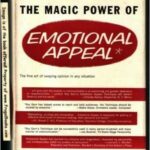Transcript: Lightly edited for clarity
A number of years ago, I was in an antique mall with my wife, and one of the things I always do is go to the book section. I always try to find an interesting book to read, and I came across this book called The Magic Power of Emotional Appeals. It’s a very old book published sometime in the 1960s. But when I read that particular book, it had some incredibly powerful lessons that I would really like to share with you.
The concept basically says that we are all very much preoccupied. We might talk about being multitaskers, but in fact, our brain is not able to multitask. We are basically focused on one thing, and we have a switching time that actually occurs to get to the next task.
My wife often says that I have selective hearing. What that really means for me is the fact that I am very focused, and she might talk to me, but I don’t hear her. So that’s what this book really tried to talk about. It addresses the questions of what would my wife be able to say to me that would jar me out of whatever I was doing and force me to listen to what she had to say.
Effectively when it comes to entrepreneurship, that’s a very powerful tool to jerk somebody out of their preoccupation and bring them into the fold to give you their undivided attention. There are four emotional appeals that come out of that particular book
Money
The first one is related to money. Whether it’s to get rich quick, make more money, or just save money, it doesn’t really matter. It’s generally focused on some type of monetary gain. When somebody hears something about money, they generally are mentally pulled out of what they are doing because everybody is interested in money.
You see these all the time in regular ads, “buy one get one.” Or “I lost my dog,” nobody cares, but if you say “reward for the dog,” people might pay attention.
A tool that I use quite frankly, and it’s been very successful for me, is when I do a trade show. Oftentimes I’m really trying to get the attention of people as they are walking by my booth, or in other cases, maybe there’s a small group of people standing in front of my booth having a conversation. Since they are not really talking to me, I want to get their attention; if nothing else, I just want them to move on so that people will feel more comfortable coming into my booth. What I will always do when I go to a trade show is have a wad full of coins in my pocket. What I’ll end up doing is I’ll drop a bunch of coins on the floor. I can tell you instantly that the conversation stops, and they all turn around to look at me. I then say, “Hey, let me tell you about my product…” I interject myself into that conversation right away. That is the power of money as an emotional appeal.
Self-Preservation
Another one is self-preservation. We have all had those situations where we might be sitting there preoccupied or whatever, and maybe an amber alert comes in. Boom, it drags our attention immediately. Or sometimes, something like a shooting comes on the news. Boom, your attention is drawn to see if the shooter is nearby. Even things like religion, for example, are based upon the premise of self-preservation. While it might not be in this particular life, it might be in the afterlife. A situation today with Preppers, for example, you know, preparing for the eventuality of a societal breakdown. That’s very popular these days, and it’s all based on the entire concept of self-preservation.
Recognition
The third emotional appeal is called recognition. When you recognize somebody’s achievement, you get their attention. Whether it is at an award show or whatever the case. One of the ones that are most obvious to me is Mary Kay. If you ever see a good salesgirl from Mary Kay, they’ll be driving a pink Cadillac. They drive around town, and that’s the ultimate in recognition.
I remember a story from In Search of Excellence, one of the first business books I ever read when I first became a manager, written by Tom Peters. He talked about a situation where in a factory, the managers of this Factory were attempting to instill in their workers a desire to build more products during the day. I can’t remember the exact numbers, but let’s say during the day shift, they produced eight of these widgets. So at the end of their shift, the day manager took a big piece of chalk, and they wrote on the walkway where you come in, the number eight. The people coming in for the night shift looked at that eight and said what’s that all about. They were told that’s how many widgets the day shift made today. The next day when the day shift showed up for work, they saw that the eight was all scribbled out, and there was a big nine.
It’s the power of recognition that all of a sudden caused the night shift to do more. Then the day shift even wanted to come in and maybe produce ten that day. So again, that value of recognition is a very, very powerful emotional appeal.
Romance
The last of those emotional appeals is romance. All right, you see this all over, especially at the bottom of news articles. Frequently you will see these things like “How to look younger” or “How to lose weight,” all those things are all about trying to make you as a human look better to the opposite sex.
Whether it’s a testosterone booster kind of a thing that will increase your virility as a male or whatever the case is. Even more attractive political candidates garner more votes than the less attractive ones. We are preoccupied with romance.
I want to share a story that resonates with me about one of the most successful Jewel thieves of all time. She was, in fact, a woman. She was a rather buxom woman who would go into a jewelry store with a very low-cleavage dress. She would pick out her mark, which was always a male salesperson. She would always have a fake piece of jewelry in her hand, and she would tell the salesperson that she was interested in that. As she was pointing, she would make it a point to lean over so that the salesperson could see her cleavage. She knew that was where his attention was, and so while he was looking down her dress, she would take the one that she had in her hand and put it in the box while pulling out a real piece of jewelry.
There the only time she ever got caught. Quite frankly, it was when the salesman was in horrible pain. I can’t remember if it was back pain or tooth pain or something, and he just couldn’t pay attention, and he didn’t respond to her sex appeal. As a result, he actually saw her doing the swap, and that’s how she ended up getting caught.
So I think you know, as any kind of entrepreneur, if you can involve one of those four emotional appeals. Be it money. be it self-preservation, some form of recognition, or some kind of romance in your marketing situation, your marketing efforts will gain much more traction because you’ll actually be able to get the attention of the other person.
Related post: How To Make People Stop And Pay Attention With Emotional Appeals












